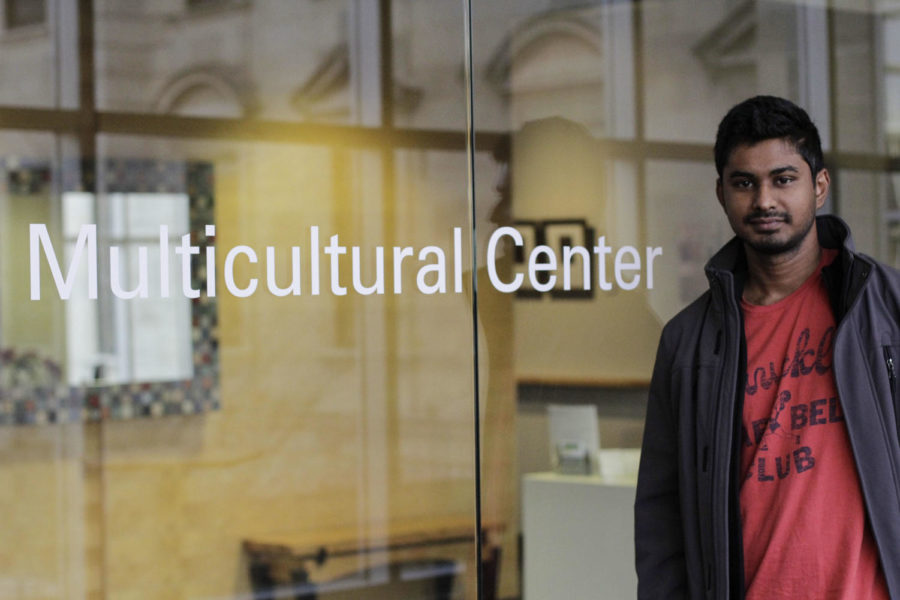Exploring the world: International graduate students come from multiple countries
Hannah Hoolihan/Iowa State Daily
Abishek Reddy Mannemala, originally from Southern India, is a first-year graduate student at Iowa State University. His major is in supply chain and information systems.
November 7, 2014
Some students at Iowa State have to learn an entirely different culture in addition to their required coursework.
International students come to Iowa State from just about every corner of the planet. This includes regions as far as Egypt and Bangladesh, to closer countries like Canada and Venezuela. Learning the American system of education can be hard enough when earning a bachelor’s degree, but pursuing a master’s degree can be even more challenging.
Studying in the U.S. is appealing to international students for many reasons: to start a life in the country, to see the world, or to take advantage of opportunities not offered in their home country.
Abishek Reddy Mannemala, first-year graduate student in management information systems, said he came to the U.S. to continue his education for a mixture of reasons.
“They offer graduate programs in India, but they’re not very good,” Mannemala said. He comes from Chennai, a city in southern India, where he received his B.A. in electronics and communications engineering from Anna University.
“The main reason I came here was to see how other parts of the world work,” Mannemala said.
This mentality is common with American students as well, who may take the opportunity to study abroad.
Studying in a different country has challenges as well. Although Mannemala has been able to speak English since kindergarten, many international students find the language barrier difficult to deal with.
Learning a new language isn’t the only challenge. Finding housing can be troublesome for some international graduate students.
Students have the option be placed with hosts until they are able to find more permanent housing, but in some cases, the prospects of finding living arrangements do not improve.
“Some students who came this semester found it really hard,” Mannemala said regarding housing.
Mannemala said Iowa State generally does a good job serving international students, but the university could help more with finding accomodations.
When looking at the numbers of graduate students from different countries, this lack of housing may not seem as surprising.
According to the Office of the Registrar, out of the 4,950 total graduate students at Iowa State, 1,775 are international students. Of this number, 87 percent are from Asia, which includes 392 students from India. There are 57 students from Africa and 81 students from South America, Oceania, the Caribbean and Australia.
Other enrollment statistics are available to students on Iowa State’s website. Despite the issue of temporary housing, Mannemala applauds Iowa State’s efforts to integrate international students into American culture.
“Overall, I think they do a really good job,” he said.
Mannemala’s post-graduate school plans are to return home and use his master’s to help with his father’s company. Plans vary from student to student, as well. Students can choose to go on to receive a doctorate, start a career in the U.S., or bring the newly-acquired knowledge back home, as Mannemala is planning to do.
Coming from a different country can be overwhelming; if international students have any questions or concerns, there are resources available on campus to assist them.
“If we have any trouble with anything, we go to ISSO,” Mannemala said, referring to the International Student Scholars Office. “[It] is our main contact point.”
Cultural clubs are also available for students to join.
“There are several countries’ student associations, such as that of Japan, Vietnam, Thailand, Taiwan, Russia and Indonesia,” said Sneha Aman Singh, graduate student and senator for the information and technology services advisory committee. “You can find the list of all those associations [online].”
These resources are made available to help students integrate into American culture while maintaining their own.
International students make up 36 percent of graduate students enrolled this year. These students have to take on the extra challenge of learning a new culture in addition to earning a master’s degree.







